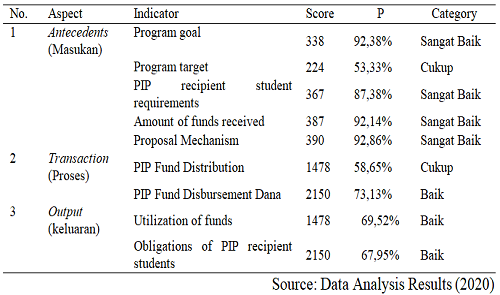
The Effectiveness of The Smart Indonesia Program in Sosa District
Abstract
This study aims to determine the effectiveness of the implementation of the Smart Indonesia Program in Sosa District. This study used an evaluation research model, namely the Evaluation Countenance Stake model with a quantitative approach. The population in this study were all 153 students who received the Smart Indonesia Program for Senior High Schools in Sosa District, and the sample was taken using Isaac Michael's table totaling 105 people with an error rate of 5%. The data were obtained using questionnaires and interviews, then analyzed descriptively by statistical means. The results of this study indicate that in general the implementation of the Smart Indonesia Program in Sosa sub-district has been carried out well. Furthermore, when viewed from several aspects related to the implementation of this program, the antecedent aspect is in the very good category, the Transaction aspect is in the good category, and the output aspect is in the good category. Thus, it can be stated that the implementation of the Smart Indonesia Program in Sosa sub-district has been carried out effectively, however, to be even more effective in implementing this program, it is hoped that the program implementers involved will be more selective in the process of submitting prospective recipients of the Smart Indonesia program, providing socialization to students and parents regarding the distribution of the Indonesia Pinta Program, and forming a monitoring team on the use of funds for the Smart Indonesia Program.
Keywords
Full Text:
PDFReferences
Ananda, R., & Rafida. T. 2017, Pengantar Evaluasi Program Pendidikan, Medan: Perdana Publishing
Astuti, R. S. (2017). Implementasi kebijakan kartu indonesia pintar dalam upaya pemerataan pendidikan tahun ajaran 2015/2016 di smp n 1 semin. Spektrum Analisis Kebijakan Pendidikan, 6(2), 121-127.
Aziz, A. R. (2019). Implementasi Instruksi Presiden (Inpres) No 07 Tahun 2014 tentang Kebijakan Kartu Indonesia Pintar (KIP) dalam Meningkatkan Mutu Pendidikan Masyarakat Miskin di Indonesia. Jurnal Pemerintahan dan Politik, 4(2).
Darodjat, D., & Wahyudhiana, W. (2015). Model evaluasi program pendidikan. Islamadina: Jurnal Pemikiran Islam, 1-23.
Harahap, Y., Makhdalena, M., & Zulkarnain, Z. Pengaruh kualitas pelayanan akademik dan sarana prasarana pendidikan terhadap kepuasan mahasiswa fakultas keguruan dan ilmu pendidikan (fkip) universitas riau. Jurnal JUMPED (Jurnal Manajemen Pendidikan), 7(1), 116-128.
Kamsihayati, S., Sutomo, S., & Suwarno, S. (2017). Kajian faktor-faktor penyebab anak putus sekolah di Desa Jangrana Kecamatan Kesugihan Kabupaten Cilacap. Geo Edukasi, 5(1).
Karmila, K. (2019). Efektivitas Program Indonesia Pintar (PIP) Terhadap Rintisan Wajib Belajar 12 Tahun Di Kecamatan Blangkejeren Kabupaten Gayo Lues. Jurnal Ilmiah Mahasiswa Fakultas Ilmu Sosial & Ilmu Politik, 4(4).
Machali, I. (2018). The Handbook of Education Management: Teori dan Praktik Pengelolaan Sekolah/Madrasah di Indonesia Edisi 2 (Vol. 2). Prenada Media.
Mutiarin, D., 2014, Manajemen Birokrasi dan Kebijakan, Yogyakarta: Pustaka Pelajar.
Pagau, R. M., Kimbal, M., & Kumayas, N. (2018). Efektivitas pembinaan warga binaan di lembaga pemasyarakatan klas iia manado. Jurnal eksekutif, 1(1).
Pasalong, H. 2013, Teori Administrasi Publik. Bandung: Alfabeta.
Rohaeni, N. E., & Saryono, O. (2018). Implementasi Kebijakan Program Indonesia Pintar (PIP) Melalui Kartu Indonesia Pintar (KIP) dalam Upaya Pemerataan Pendidikan. Indonesian Journal of Education Management & Administration Review, 2(1), 193-204.
Saraswati, L. N. (2017). Implementasi Kebijakan Program Indonesia Pintar (PIP) pada Jenjang Sekolah Dasar di Kecamatan Sungai Pinang Kota Samarinda. EJournal Administrasi Negara, 5(4), 6737-6750.
Sondang P. Siagian., 2008. Manajemen Sumber Daya Manusia. Bumi Aksara, Jakarta.
Suarman, S., Sumarno, S., & Arum, A. (2011). Analisis Kepuasan Mahasiswa terhadap Kualitas Pembelajaran Dosen Program Studi Pendidikan Ekonomi Fkip Universitas Riau. Jurnal Pendidikan Ekonomi dan Bisnis, 3(03), 8981.
Suhardan, D 2012, Ekonomi dan Pembiayaan Pendidikan. Bandung; Jakarta.
Tamam, B. (2018). Reorientasi Pendanaan Pendidikan Dalam Membangun Mutu Sekolah. Misykat Al-Anwar, 29(2), 257189.
Togatorop, M. (2017). Pengaruh biaya pendidikan terhadap mutu sekolah SMA swasta. SCHOLARIA: jurnal Pendidikan dan Kebudayaan, 7(3), 234-240.
DOI: http://dx.doi.org/10.31258/jes.5.3.p.533-541
Refbacks
- There are currently no refbacks.
Copyright (c) 2021 EMIL Liza

This work is licensed under a Creative Commons Attribution 4.0 International License.
Publisher: FKIP Universitas Riau












